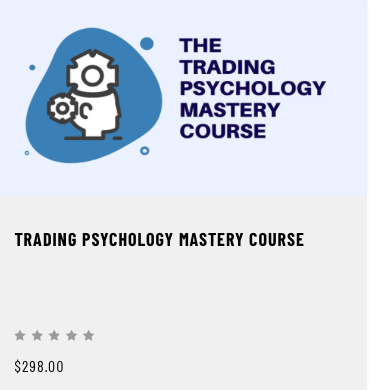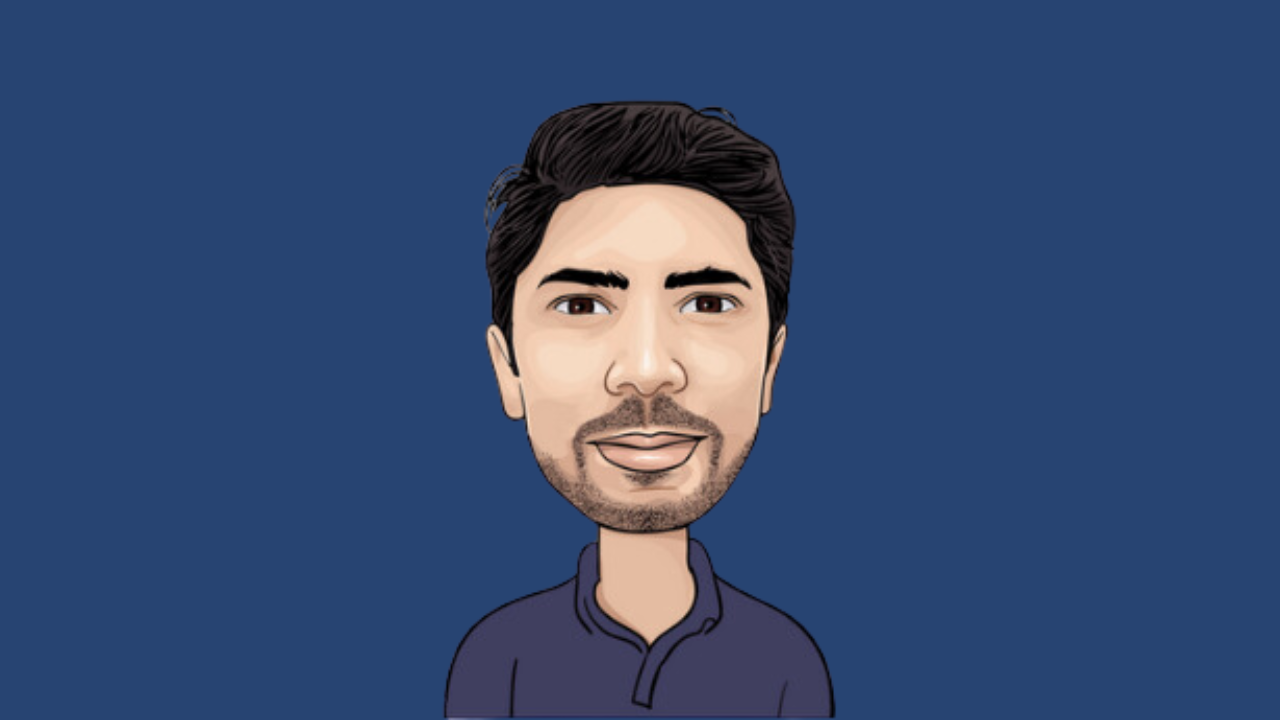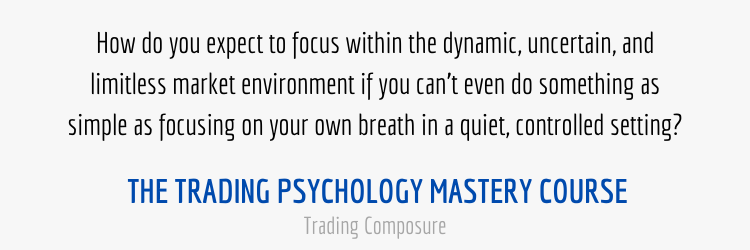Who is Yvan Byeajee and What is The Trading Psychology Mastery Course?
Yvan Byeajee is the founder of Trading Composure – a website that offers articles, meditations, and courses focused on the psychological aspect of trading. The best course offered at Trading Composure is The Trading Psychology Mastery Course. The information offered in this course is based on Yvan’s own unique, personal experiences with both meditation and trading. When he first started trading, he brought with him a stockpile of denied impulses and unmet desires, which isn’t unlike most other traders. In an effort to gain recognition, wealth, and status, most traders enter the market with completely ineffective mindsets.
Yvan was no different. As a result, he ended up losing roughly 90% of a $100,000 starting portfolio within a handful of years due to his impulsive and irrational tendencies. Feeling emotionally battered and disoriented, he decided to go on a 6-month meditation retreat. This was an act of desperation, and luckily, the introspective journey ended up being one of the best decisions of his life. After months of exploring and reflecting on the nature of his suffering, he became more peaceful, accepting, balanced and consistent. He now felt like he had a special set of skills to help him take on the market without continuously sabotaging his own results.
What is Mindful Trading and Why is it So Critical to Success in the Market?
Mindful trading is the process of being aware of your own thoughts, emotions, and behaviors while trading. It’s a method of self-observation that allows you to pinpoint exactly what you’re doing right and what you’re doing wrong when it comes to your attitudes, beliefs, perspectives, and actions within the market environment. Instead of mindlessly falling into habits of overtrading in fear of missing out on opportunities, removing stop losses in fear of being wrong, and many other destructive behaviors, you make a conscious effort to become cognizant of your choices. As painful as it might be to discover, change can’t happen without conscious awareness.
This is a paraphrased quote about mindfulness meditation from The Trading Psychology Mastery Course that really stuck with me:
Unfortunately for Yvan and most other traders out there, the concept of mindful trading hits their radar screens a little bit late. Consequently, most traders have to learn the hard way by being emotionally and financially bullied by the market first. Yvan personally experienced debilitating circumstances that almost drove him out of trading forever, but fortunately the stunning insights he acquired on his meditation retreat were the catalysts for turning it all around. Ultimately, he used the market, his trading results, and the contents of his own mind exactly the way he should have – as a feedback mechanism for personal evolution and improvement. While most traders vehemently ignore it, resist it, or fail to even realize it, trading is predominantly a mental discipline.
How Does The Trading Psychology Mastery Course Teach and Support Mindful Trading?
 The Trading Psychology Mastery Course teaches mindful trading through lessons, guided meditations, and follow-up exercises & challenges. It’s estimated that only about 15% of people meditate even though it’s one of the most important self-improvement habits recommended by scientists, therapists, doctors, and business leaders. Meditation is a foundational exercise in self-awareness and concentration – not just for traders, but everyone. There’s usually a lot of initial resistance and confusion when it comes to meditation, but it’s a secular practice. It’s simply brain exercise.
The Trading Psychology Mastery Course teaches mindful trading through lessons, guided meditations, and follow-up exercises & challenges. It’s estimated that only about 15% of people meditate even though it’s one of the most important self-improvement habits recommended by scientists, therapists, doctors, and business leaders. Meditation is a foundational exercise in self-awareness and concentration – not just for traders, but everyone. There’s usually a lot of initial resistance and confusion when it comes to meditation, but it’s a secular practice. It’s simply brain exercise.
Within this course, Yvan harnesses the power of meditation to teach his students how to recognize and understand their own personal mental barriers, become more present, and examine bad trading decisions. There are many misconceptions about meditation – the major one being that it’s about not thinking or feeling at all. But that’s untrue. It’s about changing your relationship with your thoughts. Having thoughts and emotions is a natural part of living, but you can develop an understanding of their impermanent nature and choose not to associate with them if you don’t want to. Overall, meditation has been scientifically proven to reduce anxiety and stress, while increasing self-awareness, patience, focus, and resilience. Sounds exactly like what most people need – especially traders.
Conclusion – Who Should Use Yvan Byeajee’s Trading Psychology Mastery Course?
There are many traders who feel extremely frustrated and inadequate, and it’s usually a mindset issue. They cling to every passing thought and blindly follow all of their impulses. Due to their untrained attention and overall undisciplined mind, their actions are mindlessly dictated by emotions. Some of the common symptoms include not being patient enough to wait for entry and exit signals based on their plans, constantly tweaking stop losses and profit targets, strategy-hopping in fear of missing out, and becoming overly excited on winning trades or depressed on losing trades. These are all signs that their mental framework needs adjustment.
| This Course is For Traders Who: | This Course is Not For Traders Who: |
|---|---|
|
|
Those who see the best results from using this course possess two critical elements: 1) desire to change, and 2) willingness to take action. Without these two elements, you probably won’t see an impact in your trading process and results. The desire to change is absolutely crucial because you have to become an entirely new trader. You essentially have to acquire a new self-image and identity – going from an undisciplined and inconsistent trader to a disciplined and consistent trader. And the willingness to take action is what produces the change. Without repetition of mindfulness and meditation practices, you simply can’t internalize the new characteristics you want: patience, balance, discipline, consistency, objectivity, etc. In the end, you get out of it what you put into it.
This course provides the tools for self-examination. It’s geared toward trading, but it also applies to life. It’s entirely your choice how you choose to operate within the market and life in general – mindfully or mindlessly. Make the right decision.
Written by Matt Thomas (@MattThomasTP)
Related Pages:
- What is The Trading Psychology Mastery Course?
- What is Trading Composure? Acquire A Heightened Level of Trading Insight
- Trading Composure Review – Learn the Importance of Mindfulness in Trading
- What is 2ndSkies Trading? Change the Way You Think, Trade, and Perform
- Can People Make Money Day Trading? It Starts With Self-Awareness





In my opinion, this training seems beneficial. As a trader, I’d like to see a positive difference in my trading process and results, as you stated that the best outcomes from the course are the desire to change and the willingness to act. Another thing I enjoy about it is that it is applicable in everyday life, not just trading. What I’m wondering about is how long it will take for me to get results.
Hi Lio – initial results from increased awareness/mindfulness can be relatively quick to achieve (just a few days). But in my opinion, it’s not about just a few days of benefits, it’s about a lifetime of having the mental tools to be more balanced, objective, and patient – not just within the markets, but in everyday life as well. Typically, it takes weeks, months, and years to see the compounding effects, and the most important part is sticking to a consistent daily practice.
This has been an interesting look at Yvan Byeajee’s Trading Psychology Mastery course. From the very beginning, the approach is one that I think needs more attention in the industry. Far too many people let their bad habits make all the big decisions, perhaps without even being aware of the root of their decisions or the consequences they may have.
I completely agree, Aly. The psychological aspect of trading is definitely underestimated by most market participants. Yvan Byeajee’s course opened my eyes to this phenomenon and it was the start of me turning around my own trading for the better.
I am a fan of psychology and it’s clearly important in trading. I didn’t realize how helpful meditating could be. I started last year but I stopped a month later because I “was busy”. Maybe it’s time I should start over again. This course seems so interesting.
Hi Dominique – meditation, and mindfulness in general, is one of the best human optimization activities. It reduces anxiety and stress, and promotes patience, balance, equanimity, and most importantly – self-awareness. All positive change/growth/development/evolution starts with awareness.
Most traders with real money on the line start operating out of a stressed-out survival mindset, which negatively impacts their decision-making process. This results in impulsive, inconsistent, and destructive tendencies. All traders, no matter what level (beginner to veteran), should have some sort of mindfulness routine to help them. There’s no doubt that most successful traders would agree that trading success is at least 80% mental and 20% tactical. So anything traders can do to gain a mental edge is crucial to success. Take care!
Trading Psychology Mastery Course seems like a great course – incorporating mindfulness and meditation into the trading process to instill calm, patience, and balance. I have experiences with similar courses not focused on trading, just meditation, such as the Transcendental Meditation (TM) of the Maharishi. I think that the Trading Psychology Mastery Course is also provide good results in life, not just trading, for making people more consciously aware.
I did not realize there was psychology behind trading. I have a small trading account in which I tend to buy and hold. In fact, I forget to even check it for weeks at a time. Do you think I need some discipline? This course does sound interesting. I am one of those people who do not meditate. Maybe I should give it a try since there seems to be hundreds of issues floating around in my brain at any given time! I fact that it helps to clear your mind is fascinating!
Hi Kay – I appreciate your comments and questions. There’s no doubt that trading is mainly a mental game. In fact, the main reason markets move is due to psychological reasons. When you break it down, people are buying, selling, and holding positions based on what they think, feel, and believe about the future. I’d estimate trading to be about 80% mental and 20% tactical, yet most market participants spend no time training their own mind. This provides an amazing opportunity for individuals committed to long-lasting trading success to acquire a substantial mental edge.
To answer your question, I think everyone in some way or another can work on cultivating more self-awareness and self-control. The reality is that when people decide to trade, they’re entering into a unique environment that they’re not used to. Dealing with risk, uncertainty, and the limitless nature of the market can have profound psychological effects. Most traders have tendencies to break their own rules by removing stop losses, doubling down on losing positions, becoming attached to trades for fear of being wrong or losing money, and the list goes on and on. It doesn’t matter how good of a market analyst you are, what your IQ is, how good you are with numbers, etc. If you can’t follow your plan, then consistent profits can never be achieved. Destructive behaviors are extremely prevalent amongst traders, yet most think their success solely lies in some magical indicator or foolproof system. But the consistency and discipline they seek has to come from within themselves.
As a side note, it’s important to understand the difference between trading and investing. The goal to “make money” is the same, but the dynamics of the two are quite different. Traders are looking for short-term opportunities, sometimes within the same week, day, hour, or even minute. These traders are mainly concerned with technical analysis. They don’t necessarily care about the long-term viability of the companies, like in the case of most penny stocks, because they’re not looking to hold their positions long-term. They want enough volatility to get in-and-out for a profit quickly. Those looking to buy-and-hold and be long-term investors, however, are more concerned with fundamental analysis. The strength and growth-potential of the underlying companies actually matter here. In my opinion, mindset is certainly critical for both, but much more important for short-term traders who are interacting within the markets on a daily basis.